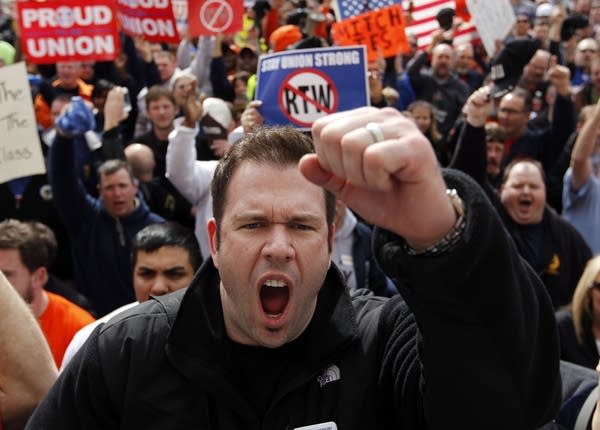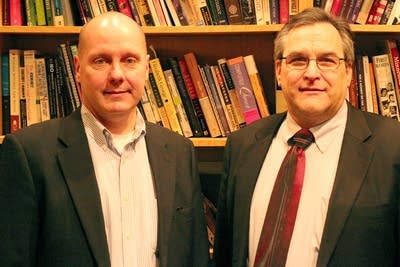One on One: The 'right-to-work' amendment

Editor's note: A week after Indiana became the first state in more than a decade to become a "right-to-work" state, Minnesota Republicans in the Legislature have proposed a "right-to-work" amendment to the sate constitution. This is a transcript of a conversation that aired today on "Morning Edition." Host Cathy Wurzer sat down with Sen. Dave Thompson, R-Lakeville, and Sen. Ken Kelash, DFL-Minneapolis.
Cathy Wurzer: What's the issue that this amendment is trying to address?
Sen. Dave Thompson: A very simple one. And that it is an attempt to allow the voters of Minnesota to decide whether people should be compelled to join a union as a condition of employment. Currently, if you want to work for an employer that has a collective bargaining agreement in place, you must join the union or if you choose not to, pay the vast majority of the dues, typically 85 percent. The only thing this will do if it passes in November, if it gets on the ballot, is it will allow people who choose not to be part of the union not to join and not to pay dues. It doesn't touch collective bargaining, doesn't touch anything else. It's a simple freedom of choice for employees.
Wurzer: I'm thinking, Sen. Kelash is a former union carpenter, that you have strong feelings on this. Why do you believe Minnesota should not enact a measure like this?
Create a More Connected Minnesota
MPR News is your trusted resource for the news you need. With your support, MPR News brings accessible, courageous journalism and authentic conversation to everyone - free of paywalls and barriers. Your gift makes a difference.
Sen. Ken Kelash: First of all, there is a way to not join a union, that is to not apply for a job at a union firm. So, that in the first place if you choose not to join a union, that's number one. Number two, if you are hired by a union firm, you have the opportunity to pay fair share dues, which is not joining the union but paying the union's cost of doing it. What this legislation, or this amendment, is trying to do is provide for a free lunch. I'd love to play at the Edina Country Club, golf, without being a member there, but it's not allowed.
The other thing it does is it disallows language in a contract between two parties which is something we haven't done in the past. The contract is decided by both the union and management, that our employees are going to belong to this union and that this union is going to represent the workers in collective bargaining over wages, benefits, working conditions, etc.
Wurzer: I want to ask Sen. Thompson about the first part of your concerns. To be clear, the shop, the company, could still be unionized. But those choosing not to join a union would still get the union benefits. Is that fair?
Thompson: They wouldn't necessarily get the union benefits. It would be up to the employer and individual employee to contract for the terms of their contract. An employer would choose to do that, but they wouldn't necessarily have to. If you don't belong to the union, you don't automatically get the protection of the union.
I would like to point out that Sen. Kelash made the point that while you shouldn't be able to join the Edina Country Club without paying the dues, we don't have a fundamental right, I believe, to belong to any organization, whatever it may be. However, we should have the right to work without having to pay a third party for that right. Quite a difference.

Kelash: You want a free lunch. What this is saying is that if a union, through years of collective bargaining, have gotten wages and benefits and better working conditions for employees, then those employees who are benefiting from that shouldn't be required to help pay the cost. One of the things that Sen. Thompson missed is that if there's a union contract in place and there are non-union employees, that union is required and obligated to represent that employee. If this goes through, one of the big problems is they're required to represent those employees even though they're not paying any dues into the organization.
Thompson: Doesn't it seem a little bizarre that, if a union is unable to voluntarily get people to join their union, they think they should have the force of law to make these people join the union or pay the fair share, which is 85 percent of the dues, in the vast majority of cases? I can think of no other example where an organization attempts to obtain customers, obtain members, obtain adherence to their program, but if you don't want to do it, the government makes you.
Kelash: On the contrary, they don't need to become members of the union if they're employed by a union. What he's saying is that we shouldn't have language in contracts that both management and labor agree on that require that this group is going to represent you in collective bargaining, it just destroys the collective bargaining process.
The bottom line is that where "right-to-work" is in place, wages are depressed, they are down. In the 22 states that have right to work, Minnesota workers earn about $5,500 more per worker.
Wurzer: Other studies show, Sen. Thompson, that wages would go up, result in higher wages. What's the correlation there?
Thompson: If you look at where states start and how they move, the movement of wages upward is upward much more quickly in states that have employee freedom, right to work.
Wurzer: Here in Minnesota, per capita income is the 11th highest in the nation and that's higher than North Dakota and Iowa, two "right-to-work" states.
Thompson: We have a significantly higher cost of living than North Dakota. You have to factor that in when you look at income relative to cost of living. For example, one of the statistics I saw, New York has a significantly higher income than some of the "right-to-work" states. Well, yeah, a studio with a Murphy bed in New York is $3,000 a month, not the case in North Dakota, you could live pretty well on 40 grand a year. If you look at the trends and if you look at what the economies have done in states that have adopted freedom for employees to choose, overall household income goes up.
Kelash: If you have a look at the most recent case of Oklahoma, it was the most recent state to go "right-to-work." Their wages went down, they had net job loss since "right-to-work" went in. What "right-to-work" is for is an effort to lower wages and compete for low wage jobs.
The strongest economies in this country are those who have a highly educated workforce like Massachusetts and Minnesota, we're not going to be able to compete on low wages with the rest of the world. We have to have an educated, strong workforce, and that requires a strong wage rate for the people who are working.
Thompson: Let's see, in order for me to have a job at the company I want to work at, I have to pay. When Sen. Kelash says, well, you don't have to belong to the union — well, no, but they're still going to get 85 percent of the dues — it's the Hotel California, you can check out any time you like but you can't leave.
Kelash: On the contrary, if you don't want to pay union dues, you don't have to work for that company. There's lots of other companies that won't require that, so it's not like you have no option. If you want the benefits this union has bargained for, then you have to pay the freight. I would love to vote for free lunch. All the "right-to-work" states have significantly higher poverty rates than Minnesota has.
Wurzer: And you're going to chalk that up to unionization?
Kelash: It certainly has to do with the ability to make a decent living. Unions help raise wages.
Thompson: That makes no sense at all because by and large it's not middle and lower-middle class people who are unionized. It's by and large public employees and people in higher paying occupations.
Wurzer: You're both good at counting noses, what really are the chances of having this pass this session?
Thompson: I don't know. I believe it's one of the best things we can do to increase the job climate in Minnesota, to attract employers to come here and grow here and make Minnesota better off. In the end of the day, I might succeed and I might not, but I step up and do what I believe is right and let the chips fall where they may.
Kelash: Here's the thing on whether or not it's got a chance to pass. The labor movement knows that there are Republicans that don't want to support this. Whether or not their caucuses allow them to or not, is going to be part of what happens as we move forward. I do know there are no Democratic votes for it.
